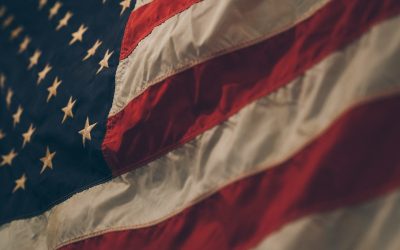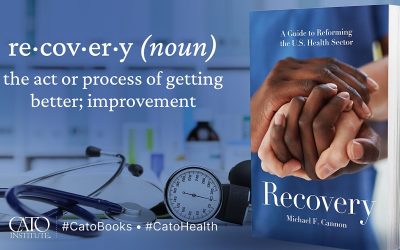C. Bradley Thompson is the Chairman of the Department of History and Political Science at Ashland University in Ohio. He received his Ph.D at Brown University. He has also been a visiting fellow at Harvard University, a John Adams Fellow at the University of London, and the Merrill Endowment Distinguished Visiting Professor at Utah State University. Thompson is the author of John Adams and The Spirit of Liberty, winner of the American Political Science Association prize for best first book in political theory. He has also edited The Revolutionary Writings of John Adams, is currently editing a volume of “Abolitionist Political Writings” and is an associate editor of the forthcoming Encyclopedia Of The Enlightenment. Thompson is a senior writer for the Ayn Rand Institute. His lectures on the political thought of John Adams have twice appeared on C-SPAN. This interview was conducted by Scott Holleran for ARB.
***
ARB: Why do you write about John Adams?
Dr. Thompson: John Adams and the Spirit of Liberty began as my doctoral dissertation; it took two years to write while I was teaching full time. I wanted to examine Adams as a thinking revolutionary engaging the great thinkers of history.
I had been an unreconstructed Jeffersonian and I had always been a fan of Thomas Jefferson. There are hundreds of books on Jefferson and it was not clear to me I could find something new to say. But with Adams—at least until recently—you could count the number of books on one hand and they were either defective or incomplete—they were essentially biographies. There was only one book [published] in 80 years on Adams’s political thought and it was defective.
I began by actually reading Adams’s writings and I realized that much of what had been written about his political thought was wrong; they had completely misinterpreted him. Modern scholars were just repeating the charges used against him—that he was a defender of aristocracy and monarchy—which is simply not true.
Unfortunately, those charges came from Thomas Jefferson.
ARB: On what grounds did Jefferson make those claims?
Jefferson’s political thought changed dramatically after he went to France in the 1780s. Jefferson was deeply influenced by French philosophers, chiefly Marquis de Condorcet. By 1789, Jefferson was a supporter of the French Revolution and he began to imbibe a radical egalitarianism—learned from Condorcet, and ultimately from [Jean-Jacques] Rousseau—Jefferson was actually defending Jacobin and the Reign of Terror.
This was a major philosophical error. As it relates to Adams, Jefferson attacked all those founders who did not support the French Revolution, including Adams but also [George] Washington.
If you read Adams’s great treatise, A Definition of the Constitutions of Government of the United States of America, there are things in it that implicate Adams in defending monarchy and aristocracy but it’s actually very shallow. Thomas Jefferson came back to his senses after the election of 1800—he admits that he was wrong about the French Revolution in a letter to John Adams.
Jefferson was the literary genius of the American Revolution. But Adams was the great mind. I’m not trying to denigrate Jefferson—I am trying to restore Adams to his rightful place in history. Pennsylvania patriot Benjamin Rush, a physician who was one of the first to use the small pox vaccine, referred to Jefferson and Adams as the north and south poles of the American Revolution.
ARB: Some historians have recently claimed that George Washington was underrated. Is this true?
Yes. Indeed, Washington was a political thinker, not a political philosopher like Adams, [Alexander] Hamilton and Jefferson. Washington’s greatest virtue was his moral character.
ARB: How did you approach your subject?
With the premise that ideas have consequences. I took Adams seriously; I don’t try to reduce Adams’s political thought to his psychology and to the culture in which he lived—I take him as an independent thinker who tries to rise above his culture. I wanted to walk with him into his library in a sense and study how he confronted the tradition of political philosophy—-extending from Plato to John Locke. I read Adams’s writings very closely and deeply.
There was one moment while I was working at the Massachusetts Historical Society, where Adams’s writings are stored, and I found his unpublished manuscripts. I discovered a piece of scrap paper where he jotted some notes and essentially laid out his methodology—his empiricist, a posteriori, inductive methodology contrasted with the hyper-rationalist, a priori, deductive method. Adams saw himself as an Aristotelian. The discovery of that paper was my Rosetta stone—it allowed me to read John Adams’s writings with more clarity.
ARB: Why do you call John Adams the Atlas of American independence?
Adams contributed more to the cause of the American Revolution than anyone. [Adams produced] some of the most important pamphlets, in which he inspired Americans to defend their liberty, the trial by jury and the novanglus—the development of the Declaration of Independence—Adams worked tirelessly for two years to move the Constitutional Congress to vote for the Declaration—he served on some 30 committees, he founded the American navy, he drafted the first model treaty—no entangling alliances—and he chaired the committee which drafted the Declaration.
ARB: Why did Adams defend British Captain Preston, who was on trial for the Boston Massacre?
He thought that, in a free country, all men deserved a fair defense. He knew that the American cause must be seen by the world as principally about justice and that America would guard absolute justice. It was not at all clear that Preston ordered his men to fire and there is some evidence to suggest that they fired only after being pelted with stones—or that they even had been fired upon first.
ARB: Adams was married to Abigail Adams for 54 years; do you have any comment on how the successful marriage may have contributed to his success?
It was a truly great love affair—and what’s remarkable is that they were separated for nine years. Adams was deeply dedicated to the cause of the American Revolution—and so was Abigail. Despite the pain and suffering they went through [due to his prolonged absence]—she raised four children by herself—she would write Adams these wonderful letters [saying] that she fully supported him being away fighting for Independence.
ARB: You refer to Adams’ thinking as inductive—will you please explain the viewpoint?
Adams began his method [of thinking] as a very young man, by recognizing that reality is knowable and knowable by reason, that the universe is governed by the eternal laws of nature and that this method is essentially an inductive method—though he would have described it as empirical.
Rather than beginning with an a priori principle, Adams began by observing human nature, by studying history and by observing man as he appeared in front of him—you see this in his diaries. For example, he’d go into the local pub, then come home and write his observations, and he would try to identify qualities of human nature that he regarded as universal.
Adams was deeply influenced by certain political philosophy, by Plato, Aristotle, Bolingbroke, Adam Smith, and Machiavelli, and through reading these authors he knew that to understand political thought, you had to understand human nature and he knew that constitutions and governments are made for humans—he was [interested in] why Athens and Rome degenerated—by the question: why did their constitutions become corrupt?
Adams concluded that law givers did not have a proper understanding of human nature, especially passion, because they thought that if all humans were perfectly rational, they wouldn’t need governments. Adams argued that framers must primarily account for spectemur agendo, the desire to be seen, that all men seek to be applauded, recognized, admired, and that this passion can be either corrupting or benevolent, that it can drive men to accomplish great deeds. But he knew that, if you don’t account for this corruption, men will corrupt the republic. Adams surveyed human nature.
ARB: Who should read your books about John Adams?
Serious students of the American Revolution.
ARB: Can you please answer the criticism that, in John Adams and the Spirit of Liberty, you should have addressed Adams’s approval of the Sedition Act?
If I were writing a book about his presidency, or just a biography, then I would have included that. This was strictly on his political thought. Also, Adams didn’t write the Sedition Act, he just signed it into law, while Jefferson was vice-president. If Jefferson was so opposed to it, he should have resigned. In fact, Jefferson enforced sedition law while he was president and Jefferson favored the concept of the Sedition Act but he wanted it enforced by the states. In fact, the act that Adams signed was much more liberal than traditional sedition law. It is, however, the one stain on Adams’s life and career.
ARB: How are the Founders’ political thoughts relevant today?
This nation was founded on a philosophical basis and, to understand American history and contemporary America, you have to understand the American Revolution and the nation’s founding, which means you have to study the ideas. The United States has the oldest constitution in the world. We are the first constitutional republic. So it is immediately relevant because the principles that established this nation are true— they were as true then as they are today.
Look at [the Islamic terrorist attacks on] September 11; America’s founding ideas are under assault— they have been for the last 100 years— and this country’s [fundamental] ideas were embodied by the World Trade Towers and the principles of the American Revolution. The towers represented reason, individualism and capitalism. The Pentagon represents the right to self defense. Those ideas were assaulted on September 11 and, if you don’t understand the ideas, you can not defend those ideas—which means you can not defend those ideas from its enemies.
I think the nation is still philosophically healthy enough that they understand the issues at stake—that they will bring pressure to bear. I’m 42, and I have never seen the American people this aroused. The students in my class—to a person—support the war effort and their views are that what we really need to take out the governments [that sponsor Islamic terrorism].
On September 12, I made remarks to all of my classes. Many students were crying and that suggested to me that they understood the issues at stake. I had one student—a B+ student in my American Political Thought class [who had informed me of his intention to enlist in the military] -who, later, knocked on my office door, sheepishly came in and said: I wanted to say thank you. You are the first and only professor who has said that my going to war is just and good. It was a very difficult moment for me because I knew he was serious; I knew he was going to war, I knew he may not come home and I knew he was going partly having been inspired by what I said.
—Scott Holleran is a freelance writer who covered both the 2000 Republican and Democratic National Conventions and conducted a series of personal, one-on-one interviews with each 2000 presidential candidate, including George W. Bush, for the Philadelphia Inquirer. Holleran’s articles have been published in the Wall Street Journal, Detroit News and the Los Angeles Times and he produces an e-mail newsletter related to the war against Islamic terrorism.
This review is made available by the Ayn Rand Bookstore (formerly Second Renaissance Books). Visit our new website to browse our full selection of book, tapes and lectures.



